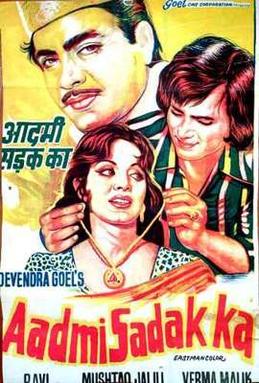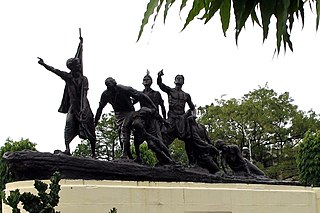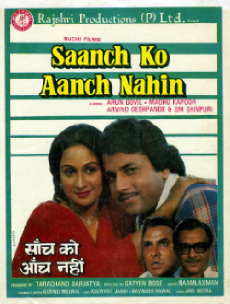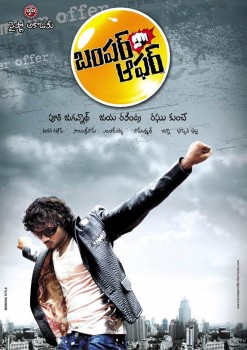This article needs additional citations for verification .(April 2019) |
Bhaiyaa is the first film with sound[ citation needed ] in the cinema of Bihar which was a Magahi language film [1] released in 1961 directed by Phani Majumdar. [2] [3]
This article needs additional citations for verification .(April 2019) |
Bhaiyaa is the first film with sound[ citation needed ] in the cinema of Bihar which was a Magahi language film [1] released in 1961 directed by Phani Majumdar. [2] [3]
Parmanand lives a poor lifestyle in a village along with his widowed stepmother, Maya, and her two children, a son, Murli, who is studying in a Bombay college, and daughter, Kamla. Parmanand is in love with beautiful Bindu and hopes to marry her someday. When Murli returns home after obtaining a degree in arts, Parmanand notices that he loves Bindu, so he steps aside and permits him to marry her much to Maya's displeasure. Shortly after the marriage, Parmanand finds out that Murli has been spending a lot of time with Chandra, the daughter of Hariram Prasad. When he counsels Murli, he gets abused, and beats Murli up. Upset at this treatment, Murli and Bindu move out. Shortly thereafter Bindu gets pregnant much to Chandra's displeasure. Chandra confronts Bindu in a bid to make her hate her child and force her to abort while Murli files a claim in Court contesting his late father's Will as a forgery. Watch what impact this has on the rest of the family.

Rajendra Prasad was an Indian politician, lawyer, journalist and scholar who served as the first president of India from 1952 to 1962. He joined the Indian National Congress during the Indian independence movement and became a major leader from the region of Bihar. A supporter of Mahatma Gandhi, Prasad was imprisoned by British authorities during the Salt Satyagraha of 1930 and the Quit India movement of 1942. After the constituent assembly 1946 elections, Prasad served as 1st Minister of Food and Agriculture in the central government from 1947 to 1948. Upon independence in 1947, Prasad was elected as President of the Constituent Assembly of India, which prepared the Constitution of India and which served as its provisional Parliament.

Pramathesh Chandra Barua was an Indian actor, director, and screenwriter of Indian films in the pre-independence era, born in Gauripur, Dhubri, Assam.

Aadmi Sadak Ka is a 1977 Bollywood drama film produced and directed by Devendra Goel, it stars Shatrughan Sinha, Zaheera, Sujit Kumar, Deven Verma, Asit Sen and Agha. The film's music is by Ravi.

Bade Dilwala is a 1983 Hindi-language action crime drama film directed by Bhappi Sonie and starring Rishi Kapoor, Tina Munim, Pran, Aruna Irani, Madan Puri, Amjad Khan, Jagdeep and Sarika. The movie was a remake of Kati Patang with a gender change.

Donga (transl. Burglar) is a 1985 Indian Telugu-language action film directed by A. Kodandarami Reddy and produced by T. Trivikrama Rao under his banner Vijayalakshmi Art Pictures. The film stars Chiranjeevi and Radha while Rao Gopal Rao, Allu Ramalingaiah and Gollapudi Maruti Rao play the supporting roles with music composed by Chakravarthy. Released on 14 March 1985, the film was a commercial success. Tamil dubbed version is titled Kolai Karan.

The Martyrs' Memorial, also known as Shaheed Smarak, is a life-size statue of seven young men who died in the Quit India movement, to hoist the national flag on the (now) Secretariat building. The foundation stone of Martyr's Memorial was laid on 15 August 1947, by the governor of Bihar, Mr. Jairam Das Daulatram in presence of Premier of Bihar Shri Krishna Sinha and his deputy Anugrah Narayan Sinha. The sculptor Devi Prasad Roychoudhury built the bronze statue of the seven students with the national flag. These statues were cast in Italy and later placed here.

Sharda Sinha was an Indian folk and classical singer. Hailing from Bihar, she predominantly sang in Maithili and Bhojpuri language and is called Bihar Kokila, the cuckoo of Bihar. Sinha has sung many folk songs including "Vivah Geet", "Chhath Geet". In 1991, she received the Padma Shri award for her contribution to music. In 2000, she received the Sangeet Natak Akademi Award for her contribution to the field of music. She was awarded Padma Bhushan, India's third highest civilian award, on the eve of Republic Day in 2018.

The cinema of Bihar, a state in eastern India, primarily consists of films in the Bhojpuri language. Bihar also has smaller Maithili- and Magahi-language film industries. Cinema in the state began during the early 20th century.
Ganga Maiyya Tohe Piyari Chadhaibo is a Bhojpuri film released in 1963 directed by Kundan Kumar. It was the first-ever Bhojpuri film, and starred Kumkum, Ashim Kumar and Nazir Hussain. It had music by Chitragupta, lyrics by Shailendra and songs sung by Lata Mangeshkar and Mohammad Rafi. The film is based on author Acharya Shivpujan Sahay's short story Kahani Ka Plot.
Bihari culture refers to the culture of the Indian state of Bihar. Bihari culture includes Angika culture, Mithila culture, Bhojpuri Culture and the culture of Magadha.

Bhojpuri cinema, also known as Bhojiwood, is the segment of Indian cinema dedicated to the production of motion pictures in the Bhojpuri language widely spoken in Bihar and eastern Uttar Pradesh. Its major production centres are Patna. Bhojpuri cinema has grown in recent years. Bhojpuri cinema also caters to second and third generation emigrants who still speak the language in Guyana, Trinidad and Tobago, Suriname, Fiji, Mauritius and South Africa.

Saanch Ko Aanch Nahin is a 1979 Bollywood drama film directed by Satyen Bose. This film was inspired by the story Panch Parmeshwar, written by the famous writer Premchand. The film was produced by Tarachand Barjatya. The film stars Arun Govil, Om Shivpuri and Urmila Bhatt, and also marked the debut of actress Madhu Kapoor.

Bumper Offer is a 2009 Telugu-language action comedy romance film directed by Jaya Ravindra. The film stars Sairam Shankar and Bindu Madhavi. The music of the film was composed by Raghu Kunche. The film released on 23 October 2009. Puri Jagannadh produced this film apart from writing the story and the dialogues. The movie was a commercial success. The movie was remade in Bengali in 2013 as Loveria.
Jaintpur is a village in Muzaffarpur district, Bihar state, India. Also known as Jaintpur Estate, it is situated on the banks of a Himalayan glacier-fed perennial river, the Baya Nadi River, between NH-102 (Saraiya) and NH-28 (Motipur).

Maitighar is a 1966 Nepali film directed by B.S. Thapa. It was the third Nepali film produced and the first featured film under a private banner. This film features bollywood actress Mala Sinha in the lead role with Nepali actor Chidambar Prasad Lohani. It is considered as a classic in Nepali cinema.
Phani Majumdar was a pioneering Indian film director, who worked in Bengali and Hindi cinema, most known for his film Street Singer (1938) starring K.L. Saigal noted for its song, Babul Mora Naihar Chhooto Jaye, Meena Kumari classic Aarti (1962) and Oonche Log (1965). He also worked in Singapore, where he notably made Hang Tuah (1955) in Malay, which was nominated for the Golden Bear at the 7th Berlin International Film Festival.

Grahasti also called Grihasti, is a 1963 Indian Hindi-language drama film, directed by Kishore Sahu. Produced by S. S. Vasan for Gemini Studios, its music director was Ravi and the lyrics were written by Shakeel Badayuni. Pandit Mukhram Sharma wrote the dialogues with cinematography by P. Ellappa. The film starred Ashok Kumar, Manoj Kumar, Rajshree, Nirupa Roy, Indrani Mukherjee, Bipin Gupta, Lalita Pawar and Gajanan Jagirdar.

Yeh Vaada Raha is a Hindi-language Indian television drama series that aired on Zee TV from September 21, 2015 to 20 January 2017. It is where the main characters, Karthik and Survi were shown in their previous birth and they are now reborn as Karthik and Survi. The show initially focused on the love story of Survi and Karthik. However the show then took an eight-year leap after Survi's death and her daughter, Khushi, who was seven years old, has grown up and marries Abeer, the new male lead of the show. it was replaced by Woh Apna Sa.

The culture of Magadh is rich with its distinct language, folk songs and festivals. In ancient period it was known as Magadha mahajanpada. The present-day Magadh region split between the states of Bihar and Jharkhand in India. The major language of the region is Magahi.
Deval Devi was the daughter of Karan Deva II. She was married to Khizr Khan, the eldest son of Alauddin Khalji, in 1308. Eight years later, Khizr Khan was executed by his brother Qutb ud din Mubarak Shah, and Deval was taken into the latter's harem. In 1320, Mubarak in turn was stabbed and beheaded by his supposed favourite, Khusro Khan, and his followers. Deval was then married to Khusro Khan. Her story, of being passed from hand to hand amongst a series of ambitious, power-hungry Muslim men is the basis of the celebrated Gujarati historical novel Karan Ghelo authored by Nandshankar Mehta.